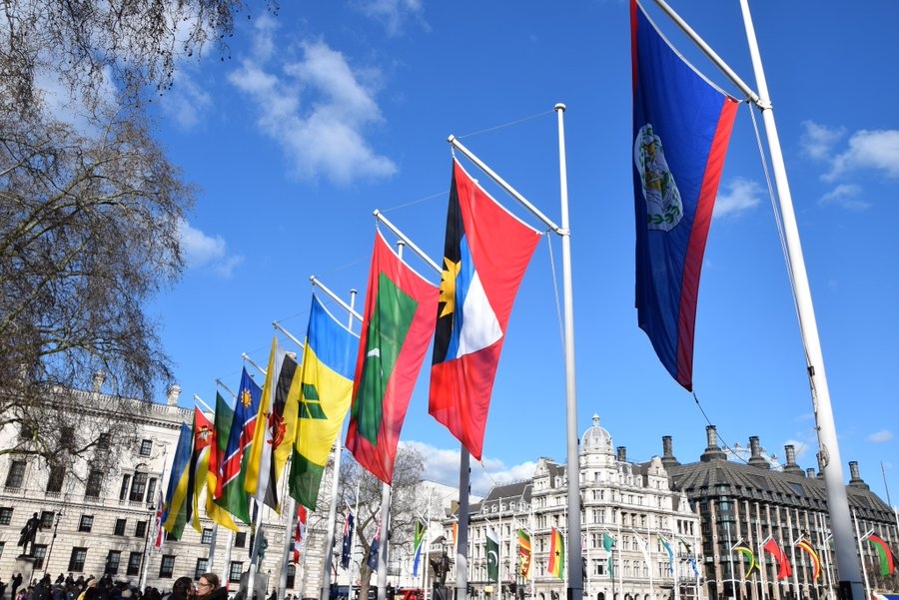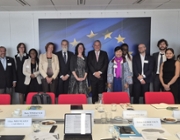Covid recovery: women and LG

08 March 2021
Women and local government have been severely impacted by the pandemic, with long-term effect; and waiting for centralised actions to trickle down to the local level is no longer an option. This was the message, as CLGF marked International Women’s Day and Commonwealth Day by taking part in an online event entitled: Enabling Women’s Leadership in a COVID-19 World to Build Back Better for the Commonwealth.
Shaping a more equal future
This was the official event of the Commonwealth Secretariat for International Women's Day and, in addition to CLGF, partners included Commonwealth Parliamentary Association, Commonwealth of Learning; the Commonwealth Foundation and the National Assembly of Pakistan - with support from the Rwandan government.
The theme was chosen to celebrate the efforts, by women and girls around the world, in shaping a more equal future and recovery from the COVID-19 pandemic. Globally, women remain significantly under-represented in many aspects of decision-making, yet they are at the helm of institutions carrying out effective and inclusive COVID-19 responses. The pandemic has threatened to roll-back the hard won efforts at reducing the barriers to women’s effective participation and leadership in public life.
The event was facilitated by CLGF Secretary-General, Dr Greg Munro. Following the welcome remarks by the Commonwealth Secretariat’s Secretary-General, The Rt Hon Patricia Scotland QC, he introduced a panel of experts: in addition to Ms Slack, other panellist included: Professor Asha Kanwar, Commonwealth of Learning; Dr Anne Gallagher and Shem Ochola, Commonwealth Foundation and Hon Shandana Gulzar Khan, MNA National Assembly of Pakistan. Local government at forefront of recovery
CLGF Deputy Secretary-General, Ms Lucy Slack, told the virtual audience that Covid-19 had placed local government and its leaders at the forefront of supporting communities by ensuring that essential services continued to be delivered: the provision of food, water, sanitation; and waste, as well as ancillary services, such as local economic development. Decentralisation is now an even greater priority and local government is key to the recovery period and all efforts to reignite the prosperity and wellbeing of our communities, particularly ensuring a green economy.
The Commonwealth promotes the empowerment of women and girls to be key change agents, as gender equality will drive the achievement of the Sustainable Development Goals (SDGs). While gender equality is built into all 17 SDGs, they also include Goal 5 to ‘Achieve gender equality and empower all women and girls. Frontline workers are predominantly women and face significant risks. Increasingly, women and girls are confronted by domestic violence, care duties, unemployment and poverty. Addressing the pandemic has brought new constraints and limited women’s influence at decision-making processes at all levels.
CLGF women's networks
Through its Commonwealth Women in Local Government Network – with individual country chapters being established around the Commonwealth – CLGF is pursuing one of its key priorities: namely, to support women both in serving, and standing as politicians; and address systemic barriers. This work includes a particular focus on enabling young women to become more involved in local politics.
Ms Slack explained that, with so many women employed in the informal sector, businesses in both the formal and informal economies need to be supported, underpinned and fully integrated. If women cannot engage economically, they will not be able to play a part in politics. Consideration needs to be given to the impact on public services: how we deliver services to meet everybody’s needs and, in particular, how we will finance them. This will inevitably involve the increased use of digital technology in future services, but without deepening the digital divide across the commonwealth.
The availability of statistics for women in national politics has helped to highlight progress but, for some years, local government figures have only been compiled by CLGF. UN Women is now collecting data, relating directly to SDG 5 which will be of great assistance. The strengthening of legislation and introduction of quotas will help to increase the number of women politicians in local government. It is also important to consider issues, such as online registration for participation; campaign financing; the use and impact of social media and other technologies on politics.
Professor Asha Kanwar, Commonwealth of Learning stressed the need for mothers and communities to empower and support girls. She said that attention should be given to training in advanced ITCs and gaining political will for increased investment. Collaboration and the celebration of women's achievements were at the heart of this.
Unlocking potential at CHOGM
Ms Slack highlighted CLGF’s partnering with the Commonwealth Secretariat and the Commonwealth Parliamentary Association in preparations for the Women’s Forum event at the forthcoming CHOGM (Commonwealth Heads of Government Meeting) in Rwanda this June. She said: “This is an exciting opportunity to come together to support women in political leadership, on all levels; to reduce the barriers that make it hard to stand; and to unlock the human, social and economic potential of women in our communities”.
Back to News





